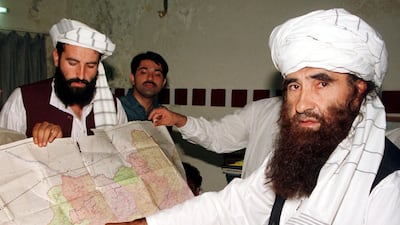The patriarch of the notorious Haqqani terrorist network who went from prized CIA asset to one of America's most sought after enemies has died, the Taliban have announced.
Jalaluddin Haqqani's career saw him at the centre of four decades of turmoil in Afghanistan as he rose up first against his king, then the Soviets, then joined the Taliban regime and finally fought American troops.
A Taliban statement did not disclose when or where he had died, but said he had been ill for several years. Haqqani is thought to have been bedridden and paralysed for up to a decade and command of his network has long passed to his sons. The network is known for its wide use of suicide bombers to target Afghan civilians, US-led Nato troops and Afghan security forces.
Haqqani's death was unlikely to make any practical difference to the running of the network, which is closely aligned with the Taliban, according to Muhammad Amir Rana, of the Pakistan Institute for Peace Studies.
“He hasn't been head of the network since around 2007. He wasn't really in any operational position,” he said.
“For the Taliban, he will be remembered as one of the successful war heroes who completed his mission and handed over the leadership to his successor.”
While Haqqani was feted by America for his resistance to the Soviet invasion, his network became one of the US's most ruthless enemies and a key source of tension between Washington and Islamabad.
The militants have carried out attacks killing hundreds of Afghan civilians as well as local and international troops, but America has blamed Islamabad for harbouring and supporting it to increase its influence in Afghanistan.
_______________
Read more:
It's time to talk peace, Nato's Afghan envoy tells Taliban
ISIS taxi drivers ferrying weapons and fighters arrested in Kabul
Former Afghan security chief considering bid for presidency
_______________
Islamabad denies the charges, but the issue is expected to be high on the US agenda during the visit of Mike Pompeo, US secretary of state, on Thursday.
A statement from family members including his son Sirajuddin, who now leads the network, said in the last years of his life Haqqani had remained committed to the unity of the Taliban and the imposition of Islamic law. Jalaluddin “was from among the great distinguished Jihadi personalities of this era,” the Taliban said in a statement posted on Twitter.
Born in 1947 into the powerful Zadran tribe found in southeastern Afghanistan's Paktia, Paktika and Khost provinces, he studied a deeply conservative form of Islam in northwestern Pakistan.
In the early 1970s he returned and set up his own religious school, and organised a movement against Afghanistan's monarch, King Zahir Shah.
Forced to leave, he set up in Miran Shah, in Pakistan's North Waziristan. Joining the resistance against the Soviet invasion of his country, his organisation and battlefield ferocity attracted the attentions of both Pakistan and the US. He was rewarded with CIA money and weapons delivered through Pakistan's government.
Jalaluddin earned the nickname "kabari", Pashto for scrap metal dealer, for his reselling of tank parts collected from the battlefield.
At the time he also became close to the Arab fighters descending on the country, and a close ally of former Al Qaeda leader Osama Bin Laden.
When the Taliban rose to power in the 1990s, he joined their regime and took up their insurgency when they were ousted from office by invading Western forces in 2001.
Washington maintains that Pakistan has kept its influence over the grouping and has done too little to stop it.
Admiral Mike Mullen, US Chair of the Joint Chiefs of Staff, said in 2011 that the network “acts as a veritable arm” of Pakistan’s military spy agency. Pakistan denies supporting or harbouring the network.

